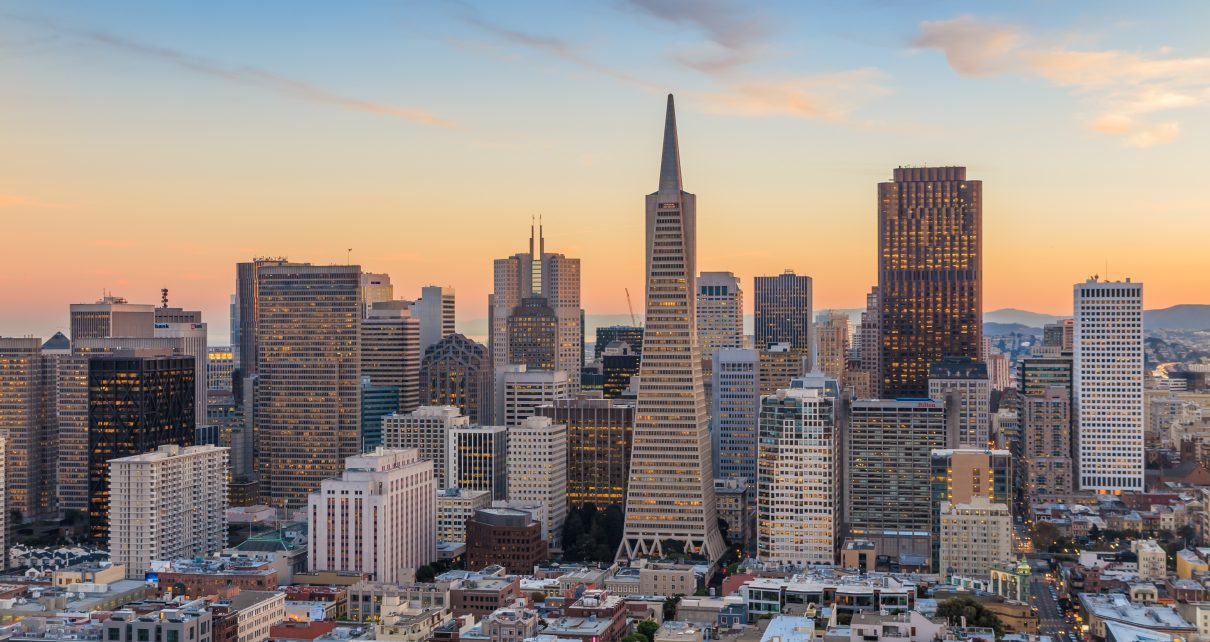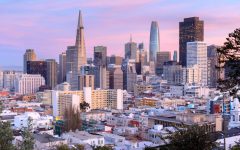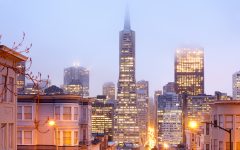
Beautiful view of business center in downtown San Francisco at sunset. (Photo: f11photo/Shutterstock)
The Cashless Ban: San Francisco’s Continued Folly
‘When we went cashless, crime dropped overnight’
By Evan Symon, June 24, 2023 2:45 am
Back in 2019, the San Francisco Board of Supervisors passed an ordinance banning nearly all “cashless” stores, or those that only accept credit cards, debit cards, and other virtual payments while not accepting cash. The Board said that such brick and mortar stores tended to disclude lower income people who often don’t have card or digital means to pay for things and only have cash on them. While many thought that their hearts were in the right place, many businesses have been horrified at the consequences.
“When we went cashless, crime dropped overnight,” said restaurant owner Lawrence Lee, whose restaurant went cashless in 2017 before being forced to revert back in 2019. “Even then the area was pretty high in crime, and we were robbed before. Having a register out front will do that. When we went cashless, you know, that ended. There was one night when two people, who were later arrested for robbery, came in and looked around strangely at the places we used to have registers. When they sat down, they asked what happened, and our server explained the switchover. They abruptly got up and left. So it saved us from at least one.”
However, when it was reverted back in 2019, crime not only went up again, but a new problem popped up as well.
“COVID,” continued Lee. “Everyone was worried about money carrying COVID, and here we all were, having to still accept cash even though it was a health risk. I mean, other stores nearby that went cashless began getting robbed again too, but COVID was a scare with that. And, there’s a lot of reasons why San Francisco became beleaguered with crime, but forcing business to accept cash definitely opened up more for robberies. I get that there are some people who prefer cash, but most people nowadays use a card or something like Venmo to pay. On two levels this was a safety issue, yet the Supervisors thought this was smart. Well, they have COVID victims and allowing multiple robberies to happen now because of their callousness.”
Throughout the 2020’s, in addition to COVID and the rise of crime, the cashless ban soon affected the resulting business exodus as well. Many stores, including all Amazon Go locations, left the city in the last few years in part due to the rise in crime and added costs for stores designed around being cashless.
And across the Bay in Oakland, restaurants and other businesses facing a rise in crime recently employed electric-only payments through cards and smartphone apps, stunting crime at those locations – just as businesses in San Francisco discovered last decade. In other cities, like Los Angeles, cashless is growing as well. Many had switched over during the pandemic and never went back, helping reduce crime and increase sales, although some have continued to say that such policies are racist due to some people not having electronic forms of payment or not even banking at all.
“There have been a few people who are mad about it, but generally most people are cool with it,” said Burbank barista trainer and coffee shop assistant manager Elsie Higgins to the Globe on Friday. “Teenagers to people in their 90s who come for coffee all get that this is the norm now. It’s only a very small segment who seem to not like it.”
Another, LA restaurant Co-Manager Peter Robb, added that “Crime goes down with cashless of course, but it also helps servers. We bring out the tablet, and they have to physically pick a tip amount. It’s a lot harder to pick zero, and we’ve seen a rise in tipping as a result. If we had to go back to cash, that would drop. Some business still like cash-only because the credit-card companies take a cut so they get more money, but we’re starting to see a more evening out with cashless now. There will always be a place for cash, but in our businesses, that’s becoming less and less of a thing.”
Back in San Francisco, even while neighbors embrace cashless stores, San Francisco has stood firm, to their growing detriment.
“I’m looking at locations outside the city now,” explained Lee. “I love the are and love California, so I’m staying. But I just cannot operate in San Francisco if I have to keep taking in cash and having it sit in a register waiting for thieves to come. I get that some people like paying with cash, but it’s also killing us.”
As of Friday, there is currently no plans to revisit the cashless ordinance in San Francisco.





Yes, crime is rampant, so let’s make sure everybody is carrying $600 of electronics containing sensitive communication and financial information to make basic everyday purchases everywhere as they travel through the extended crime scenes of our business districts. Maybe businesses could make people scan a QR code for entry to verify the identity of their patrons. We wouldn’t want any unvacc– I mean, any criminals coming in!
No. The solution to fight crime is arresting criminals. Not arresting criminals punishes the law-abiding. Eliminating cash payments punishes the law-abiding even further. This is true for both businesses and customers.
Mr. Symon has had plenty of time the past few years to observe the tactics of totalitarian transformation: create a crisis, promote the crisis, offer an unrelated “solution” that sidesteps the artificial crisis while increasing the ability to control people’s actions. It seems that without the constant “public health” propaganda of Ghaly and Newsom to parrot in every article, Mr. Symon has moved onto the new hot topic of communist totalitarianism, the cashless society, and, just as with his COVID reporting, he limits his discussion of the overall issue to the narrow band of communist propaganda.
P. S. Cash was never a COVID risk. Surface transmission was discredited very early on. So he’s still parroting COVID falsehoods w/o question. What a disgrace!
Surface survival
Numerous researchers have studied how long SARS-CoV-2 can survive on a variety of porous and non-porous surfaces 10, 11, 12, 13, 14, 15. On porous surfaces, studies report inability to detect viable virus within minutes to hours; on non-porous surfaces, viable virus can be detected for days to weeks. The apparent, relatively faster inactivation of SARS-CoV-2 on porous compared with non-porous surfaces might be attributable to capillary action within pores and faster aerosol droplet evaporation 16. – The CDC Stop getting your news from Trump.
HA HA HA HA HA HA HA HA…. what a clown….
If you think that will fix crime I got some Florida land you may want to invest in too. Arresting and jailing criminals has been proven effective
San Francisco is yet another perfect example out of California that elections do have consequences.
Logically then Al, MS, AK, OK, LA, TN, SC, WV, etc. might ask themselves if their status is related to voting for republicans. 75% of the economic productivity comes from districts that voted blue. Your comment might seem smart to a person who doesn’t think of the negative implication of the statement itself. Before you rile against me as a libtard,, I’m an independent /conservative leaning voter but who has become increasingly depressed by the drivel that passes for political discourse in this country. This paper is pure clickbait confirming all your biases.
This article is a Trojan horse; trying to attribute “cash payments” to the red state hated San Francisco to advance the interests of the fintech industry. While sF might prohibit cashless only services it probably has the highest levels of adoption of cashless transactions. . It’s has high levels of adoption of technology generally. Banning cashless only premises is not banning cashless transactions.. Fintech pushes this technology to extract value from a transaction that they add little or no value to . And then they push their guilt tipping interfaces to extract tips for services that we never previously tipped on. And ask for 20%, 25% or 30% tips so merchants don’t have to pay their own staff. And then they sell our purchasing patterns information to their partners so they can profile us to push more consumer shit.This article is bought and paid for by Fintec. Ironically these assholes are frequently based in SF. Say no to fintech; more sleazy corrupt banister bullshit. The paper is a joke. Using the culture to push others commercial agenda.
When the government, which collects taxes from people, is unable or unwilling to do its job, it always forces citizens to shoulder the burden. The voters should know better the next time they go to the poll.
communist one more way to take freedom of choice and limit all those homeless
Cashless business is a great way to keep the poor out of your business. Can’t get a credit card, Can’t do business here.
having run my own business for MANY years, before retirement, I can tell you… Yes! It IS about a profit. (tough to keep the doors open, otherwise) It’s not about one’s monetary level, it’s about reality, and what I personally experienced in SFRAN (several times), it’s sort of like locks… “They keep honest people, honest” The current systems in CA, and especially SF, aren’t working… time to face it, and GROW UP
My wife and I stopped coming into the City years ago. Between the crime , homeless ( ie . Bums) , and high prices for meals and entertainment, it’s just not pleasant anymore. I urge everyone to do the same!
“disclude?” Is that supposed to be the opposite of include? Ever hear of exclude? Or are we inventing replacements for existing words? Perhaps we should retroclude “affect” (as a verb) to underplace “impact” (as a verb), which will help to converse useless vocabulary changes.
When will people wake up ? The COURT ORDERED PHIZER REPORT has been out for some time proving the vax is total B.S. just read the first 35 pages unless you are totally ignorant it’s your funeral. If you are already vaxed well it was nice knowing you, NOT. Honestly I will glad when all the idiots have dropped dead within the next few yrs. Because of you dead dumbasses America will become total communist.
what a scammy article
just like everything these days I guess
trying to conflate the use of real money to crime however is certainly a sign of an bought and paid for publication
we don’t want your digital currency
See, I knew in the end, cashless business would love the ackward forced tip prompt that comes up every time you use your card. Server standing right there looking at you while you have a nano second to decide. For awhile I use to feel the guilty pressure to press that tip button, but no more. Im not tipping for a minute in line. And I don’t feel one bit of guilt.
First is, I wouldn’t think twice to open a cash business in SF. Why? As a business owner I have no desire to invest in a city run like SF. Thank God I am in SoCal where these soft on crime laws haven’t been instituted. The business laws and employees laws are harsh enough. To see you’re forced to use cash in high crime areas! Ha whee are those politicians standing guard over your hard earned money to pay taxes. When stolen they don’t give you a break. If I was in SF I would roll up my doors an leave. SF was once well run and beautiful. Now it’s become a circus sideshow and the beauty is like an aging starlet that stayed too long in the cameras.
I don’t have any cards, and am one of the numerous “under banked”. Most people never find out how hard it is to get back into that system after you fall out of it. If your business doesn’t take cash, I can’t go there. Yes it sucks.
What a disgusting excuse for an article! Propagandist Evan Symon using both the SF Bay Area public’s growing frustration with local crime and any lingering paranoia about contracting the Wuhan lab gain-of-function corona virus as flimsy pretexts for pushing the dystopian cashless society agenda of the diabolical World Economic Forum. Once cash is completely abandoned as a legal tender option, government and corporations will have the unlimited capacity not only to surveil all financial transactions but also to decide whether or not any given transaction will even be allowed to take place in light of an individual’s data profile and social credit score. “I am sorry, Mr. Smith, but it would not be environmentally sustainable for you to purchase another real steak this month, so the meat portion of your permissible grocery items will be temporarily restricted to Schwab’s ‘Tastes Like The Real Deal’ plant-&-insect-based meat substitutes.” “I am sorry, Ms. Karen, but our records show that your vaccination schedule of quarterly mRNA-based COVID-mitigating booster shots is not up to date. Therefore, in the interest of promoting personal responsibility and public safety, access to your checking account has been suspended until such time when you demonstrate full compliance with WHO pandemic-related global mandates.” Sounds far-fetched, you may be thinking. Well, just remember what happened in Canada only a little over a year ago during the trucker convoy free speech and anti-vaccine-mandates protest movement. Wannabe dictator – – I mean Prime Minister – – Justin Trudeau, a proud alumnus of the World Economic Forum’s Young Global Leaders indoctrination program, unjustifiably siezed emergency powers enabling his government to block electronic PayPal donations from being paid to support the protesters, and to suspend the ability of anyone labeled a protester to access their own money being held in banks. Right now, we in the United States are probably only one major crisis – – whether genuine or engineered – – away from the imposition upon EVERYONE of mandatory digital ID, a central bank digital currency in lieu of cash, and licensing as a prerequisite for personal internet access. Anyone who values the preservation of individual freedom, choice and autonomy needs to stand up now and to speak out against this mad headlong rush towards a cashless tyranny that even Orwell and Huxley did not anticipate in their prophetic dystopian novels.
YEP! 100% Daniel!!!
SF Supervisors like the image of having big hearts, but that’s not always the best way to govern. Entire nations were nearly cashless before the pandemic. Businesses that like cash? Well, many also like not having to report income. Translated to taxes. So, Sups, who’s paying your salaries?
Half way there. Cashless and inventory less. If democratic society whines, remember what was the root cause. Business people are in business to make money and help society, not provide security and police protection. Employees should feel safe at work, not be under physical attack.
I will bet the people that wrote and supported the cashless ban have no idea how credit cards works on the merchant’s side. The credit card or any cashless users can use the service for free. However not so for the merchants. If I remember right AMX will charge merchants 3.5% per transaction. Services like PayPal is even worse. The merchants will obviously pass on that cost to the customers by baking the fee into the price they charge. They are also not going to charge a different price because you paid cash. This means the people that paid cash will be charged extra. The cashless users typically have some sort of points or cash back that would cover some of that transaction cost because the credit card companies want to keep that cycle going. The cashless ban while sounds good, but it doesn’t help people that uses cash considering they are paying extra fees regardless the ban is there or not. Even if the SF mandate that the merchants charge a lower price for cash users, it won’t help because you are encouraging people to carry cash and given the crimes in SF that is not going to help for either the customer or merchants. Until the SF can get their crime rate especially robbery down, the cashless ban is a piece of worthless feel good legislation.